Menu
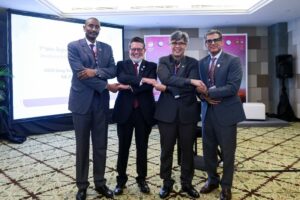
The ASEAN Centre for Energy has organised the 1st Inter-Regional Energy Forum (IREF) on 25 August 2023 in Bali as the sideline event of the 41st ASEAN Ministers on Energy Meeting (AMEM) and the ASEAN Energy Business Forum (AEBF) 2023. The 1st IREF was themed “Strengthening the Efforts towards the Energy Transition,” and aimed to foster dialogue, knowledge sharing, and capacity enhancement on the energy landscape within ASEAN and other regions. This 1st IREF was sponsored by the USAID Southeast Asia Smart Power Program (SPP).
The Forum brought together representatives from energy intergovernmental organizations: ASEAN Centre for Energy (ACE) from Southeast Asia, Organización Latinoamericana de Energía (OLADE) from Latin America and the Caribbean, African Energy Commission (AFREC) from Africa, and South Asian Association for Regional Cooperation Energy Centre (SEC) from South Asia. It also invited participants from international organizations, including International Energy Agency (IEA), Asian Development Bank (ADB), The United States Agency for International Development (USAID) Southeast Asia Smart Power Program (SPP), United Nations Economic and Social Commission for Asia and the Pacific (UN ESCAP), China Renewable Energy Engineering Institute (CREEI), Energy Transition Partnership (ETP), and Clean, Affordable, and Secure Energy (CASE) for Southeast Asia.
Dr. Nuki Agya Utama, the Executive Director of ACE, opened the Forum with remarks to explain the purpose of organizing this event. He stated that “IREF aims to establish strong communications and collaborations between regional organisations to achieve secured, accessible, affordable, and sustainable energy for all through knowledge sharing, capacity building, joint projects, policy dialogue, energy investment forums, and other forms of cooperation.”
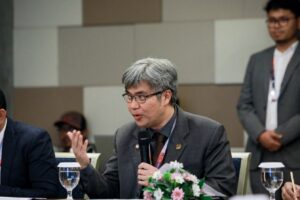
It was then followed by a presentation on “Navigating Secure Energy Transition in ASEAN” by Dr. Zulfikar Yurnaidi, the Manager of Energy Modeling and Policy Planning (MPP) department of ACE. Dr. Yurnaidi noted that under the baseline scenario as modelled in the 7th ASEAN Energy Outlook, the required energy to fuel the ASEAN economic growth from 2020 to 2050 will be four times that in the 2020 level.
He further emphasized that to reach the ASEAN Plan of Action for Energy Cooperation (APAEC) in 2025, energy efficiency measures need to be coupled with an increasing share of renewable energy. In the end, he highlighted that energy transition is inevitable, and one of the catalysts for energy transition is energy interconnection.
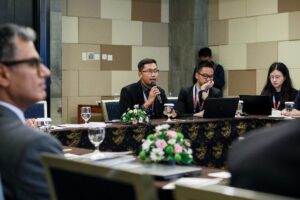
The presentation was continued by Mr. Medardo Cadena, the Director of Studies, Projects, and Information of OLADE. He revealed that in 2021, the transport sector accounted for 26% of the final energy consumption in Latin America and the Caribbean (LAC), with fossil fuels remaining the primary energy source. Nevertheless, he emphasized that 33% of the total energy supply in 2021 had come from renewables.
In fact, Mr. Cadena pointed out that the diversity and abundance of unconventional and renewable energy resources in the region is one of its strengths. In 2021, 676 GW of hydropower was identified, with 29% (around 190 GW) of it having been harnessed, accounting for 41% of the total installed capacity in LAC.
In total, 60% of the installed power capacity had come from renewable energy. This development will be critical to meet the final energy consumption in the region, which is predicted to grow by 63% in 2050. On the last note, Mr. Cadena acknowledged that fossil fuels will continue to play an important role in the region’s energy landscape.
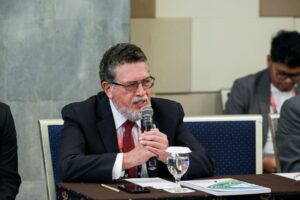
The next presentation was provided by Mr. Rashid Abdallah, the Executive Director of the AFREC. He conveyed that 80% of the electricity production in Africa is dominated by fossil fuels. He further stated that the electricity generation per capita per year is about 600 kWh, which is far less than the global average (3,100 kWh). This is aggravated by the fact that almost 50% of the population in Africa has no access to electricity.
Mr. Abdallah said that the way forward for Africa is to strike a balance between meeting its energy demand in the short, medium, and long term and pursuing the energy transition to cleaner sources. For the short term, he specifically emphasized the critical role of natural gas in expanding modern energy access and accelerating the uptake of renewable energy.
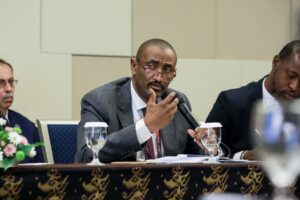
The last presentation was delivered by Mr. Ahsan Javed, the energy expert of the SEC. He stated that the primary energy consumption varies widely by fuel sources from one country to another. He further explained that India, as the largest energy consumer in the region, is heavily dependent on coal, accounting for around 65% of its total energy supply.
On the other hand, Bangladesh and Pakistan are highly reliant on natural gas, while Bhutan and Nepal are predominantly dependent on hydropower. Mr. Javed highlighted in the end that some of the energy policies and plans in South Asian countries, such as Sri Lanka and Pakistan, have targeted electricity to be primarily generated from renewable energy.
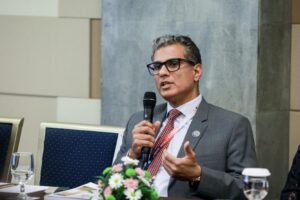
After the presentations, Mr. Beni Suryadi, Manager of ACE, moderated the roundtable discussion to discuss two big questions, which are “How could the regions collaborate?” and “How could the overall ecosystem collaborate and support?”
Based on this session, the Forum noted several key takeaways. It was noticed that the problems faced by the regions are common, with differences on the scale of the problems. These problems include energy accessibility, financial inflows to the renewable energy development, and regulatory and institutional capacity.
Some activities were proposed to collectively address these obstacles. Capacity building, joint research, and information sharing on organizational and institutional development were seen as ways to collaborate on this pursuit. More specifically, it was recommended that these regional organizations build a working group to advance the collective efforts towards the energy transition.
Participants from international organizations also acknowledged the significance of knowledge sharing between the regional organizations. They noted that as one organization may have faced challenges currently encountered by another, the transfer of lessons learned will be critical to swiftly address them. They also expressed their enthusiasm to provide any form of assistance to allow the collaboration to happen.
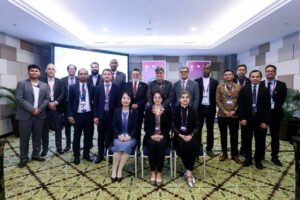
During the closing remarks, all speakers welcomed the idea of organizing and hosting similar events in the future. It is also well noted that they found the 1st IREF successful in achieving its goal: initiating stronger collaboration between the regional energy organizations and international partners. In particular, Dr. Utama re-emphasized the importance of this collaboration and eagerly anticipated its consolidation by creating inter-regional working groups. ACE will further coordinate with OLADE, AFREC, and SEC to organize follow-up activities and joint efforts to escalate the energy transition commitments.
